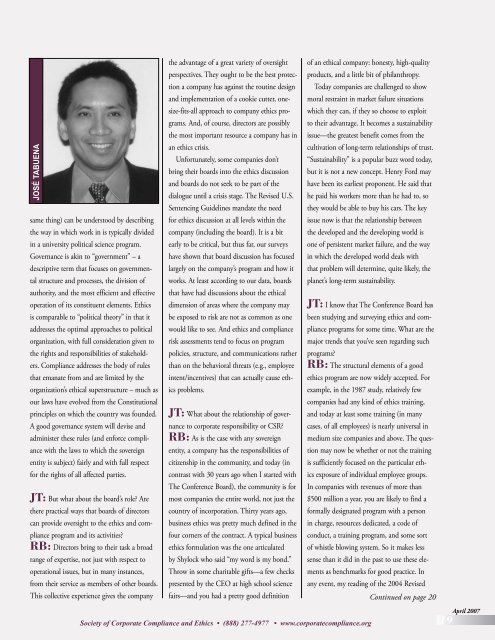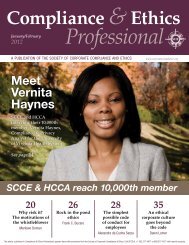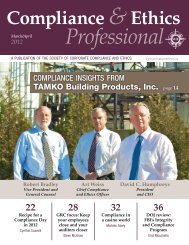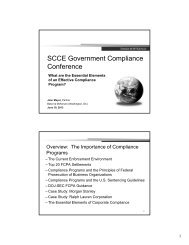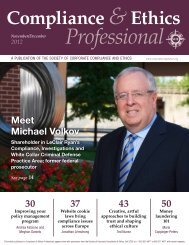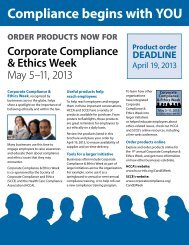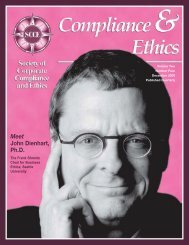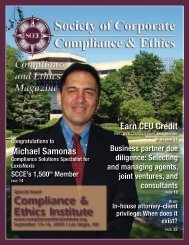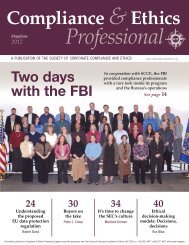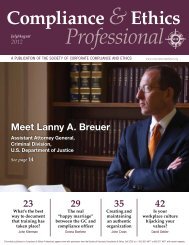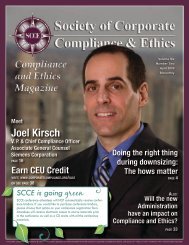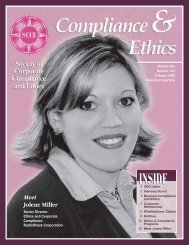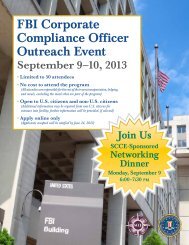Meet Ronald Berenbeim - Society of Corporate Compliance and Ethics
Meet Ronald Berenbeim - Society of Corporate Compliance and Ethics
Meet Ronald Berenbeim - Society of Corporate Compliance and Ethics
You also want an ePaper? Increase the reach of your titles
YUMPU automatically turns print PDFs into web optimized ePapers that Google loves.
José Tabuena<br />
same thing) can be understood by describing<br />
the way in which work in is typically divided<br />
in a university political science program.<br />
Governance is akin to “government” – a<br />
descriptive term that focuses on governmental<br />
structure <strong>and</strong> processes, the division <strong>of</strong><br />
authority, <strong>and</strong> the most efficient <strong>and</strong> effective<br />
operation <strong>of</strong> its constituent elements. <strong>Ethics</strong><br />
is comparable to “political theory” in that it<br />
addresses the optimal approaches to political<br />
organization, with full consideration given to<br />
the rights <strong>and</strong> responsibilities <strong>of</strong> stakeholders.<br />
<strong>Compliance</strong> addresses the body <strong>of</strong> rules<br />
that emanate from <strong>and</strong> are limited by the<br />
organization’s ethical superstructure – much as<br />
our laws have evolved from the Constitutional<br />
principles on which the country was founded.<br />
A good governance system will devise <strong>and</strong><br />
administer these rules (<strong>and</strong> enforce compliance<br />
with the laws to which the sovereign<br />
entity is subject) fairly <strong>and</strong> with full respect<br />
for the rights <strong>of</strong> all affected parties.<br />
JT: But what about the board’s role Are<br />
there practical ways that boards <strong>of</strong> directors<br />
can provide oversight to the ethics <strong>and</strong> compliance<br />
program <strong>and</strong> its activities<br />
RB: Directors bring to their task a broad<br />
range <strong>of</strong> expertise, not just with respect to<br />
operational issues, but in many instances,<br />
from their service as members <strong>of</strong> other boards.<br />
This collective experience gives the company<br />
the advantage <strong>of</strong> a great variety <strong>of</strong> oversight<br />
perspectives. They ought to be the best protection<br />
a company has against the routine design<br />
<strong>and</strong> implementation <strong>of</strong> a cookie cutter, onesize-fits-all<br />
approach to company ethics programs.<br />
And, <strong>of</strong> course, directors are possibly<br />
the most important resource a company has in<br />
an ethics crisis.<br />
Unfortunately, some companies don’t<br />
bring their boards into the ethics discussion<br />
<strong>and</strong> boards do not seek to be part <strong>of</strong> the<br />
dialogue until a crisis stage. The Revised U.S.<br />
Sentencing Guidelines m<strong>and</strong>ate the need<br />
for ethics discussion at all levels within the<br />
company (including the board). It is a bit<br />
early to be critical, but thus far, our surveys<br />
have shown that board discussion has focused<br />
largely on the company’s program <strong>and</strong> how it<br />
works. At least according to our data, boards<br />
that have had discussions about the ethical<br />
dimension <strong>of</strong> areas where the company may<br />
be exposed to risk are not as common as one<br />
would like to see. And ethics <strong>and</strong> compliance<br />
risk assessments tend to focus on program<br />
policies, structure, <strong>and</strong> communications rather<br />
than on the behavioral threats (e.g., employee<br />
intent/incentives) that can actually cause ethics<br />
problems.<br />
JT: What about the relationship <strong>of</strong> governance<br />
to corporate responsibility or CSR<br />
RB: As is the case with any sovereign<br />
entity, a company has the responsibilities <strong>of</strong><br />
citizenship in the community, <strong>and</strong> today (in<br />
contrast with 30 years ago when I started with<br />
The Conference Board), the community is for<br />
most companies the entire world, not just the<br />
country <strong>of</strong> incorporation. Thirty years ago,<br />
business ethics was pretty much defined in the<br />
four corners <strong>of</strong> the contract. A typical business<br />
ethics formulation was the one articulated<br />
by Shylock who said “my word is my bond.”<br />
Throw in some charitable gifts—a few checks<br />
presented by the CEO at high school science<br />
fairs—<strong>and</strong> you had a pretty good definition<br />
<strong>of</strong> an ethical company: honesty, high-quality<br />
products, <strong>and</strong> a little bit <strong>of</strong> philanthropy.<br />
Today companies are challenged to show<br />
moral restraint in market failure situations<br />
which they can, if they so choose to exploit<br />
to their advantage. It becomes a sustainability<br />
issue—the greatest benefit comes from the<br />
cultivation <strong>of</strong> long-term relationships <strong>of</strong> trust.<br />
“Sustainability” is a popular buzz word today,<br />
but it is not a new concept. Henry Ford may<br />
have been its earliest proponent. He said that<br />
he paid his workers more than he had to, so<br />
they would be able to buy his cars. The key<br />
issue now is that the relationship between<br />
the developed <strong>and</strong> the developing world is<br />
one <strong>of</strong> persistent market failure, <strong>and</strong> the way<br />
in which the developed world deals with<br />
that problem will determine, quite likely, the<br />
planet’s long-term sustainability.<br />
JT: I know that The Conference Board has<br />
been studying <strong>and</strong> surveying ethics <strong>and</strong> compliance<br />
programs for some time. What are the<br />
major trends that you’ve seen regarding such<br />
programs<br />
RB: The structural elements <strong>of</strong> a good<br />
ethics program are now widely accepted. For<br />
example, in the 1987 study, relatively few<br />
companies had any kind <strong>of</strong> ethics training,<br />
<strong>and</strong> today at least some training (in many<br />
cases, <strong>of</strong> all employees) is nearly universal in<br />
medium size companies <strong>and</strong> above. The question<br />
may now be whether or not the training<br />
is sufficiently focused on the particular ethics<br />
exposure <strong>of</strong> individual employee groups.<br />
In companies with revenues <strong>of</strong> more than<br />
$500 million a year, you are likely to find a<br />
formally designated program with a person<br />
in charge, resources dedicated, a code <strong>of</strong><br />
conduct, a training program, <strong>and</strong> some sort<br />
<strong>of</strong> whistle blowing system. So it makes less<br />
sense than it did in the past to use these elements<br />
as benchmarks for good practice. In<br />
any event, my reading <strong>of</strong> the 2004 Revised<br />
Continued on page 20<br />
<strong>Society</strong> <strong>of</strong> <strong>Corporate</strong> <strong>Compliance</strong> <strong>and</strong> <strong>Ethics</strong> • (888) 277-4977 • www.corporatecompliance.org<br />
April 2007<br />
19


